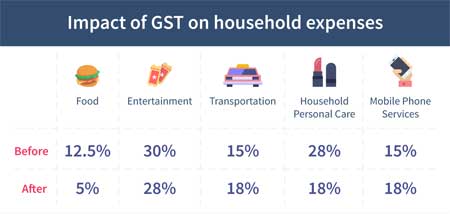GST & Common Man
GST | Suryaa Desk | Published :The much awaited Goods and Services Tax system, purported to be a huge relief for the nation from the earlier multiple tax system (i.e., excise, VAT and service tax), is now in effect from the date already set for it, that is, July 1, 2017.
The slogan raised by the government is ‘One Nation, One Tax’, although the opposition parties criticize the GST to be just a brand name change, with the same complexity involved as it was in earlier tax system. But the Government says that the ‘in effect’ GST system will ease the burden on common man, as it simplifies and integrates instead of the previous complex and multi-tax system.
Critics of the tax system from the economic & financial analysts’ circles say that the GST system in its due course will result in inflation, crumbling the business and service sectors of the country. The reason they cite is that many of the common, essential product’s and service’s tax rates have been increased and the rates of luxury items decreased.
So, the case is the same, as it happens with every governmental move, to which the ruling party tries to portray it in a positive and constructive way and the opposition tries to bring forward the negative sides of the move. The good example of this was seen in the J&K assembly with the opposition trying its level best to halt the implementation of GST in the state, because of which the government’s slogan, ‘One Nation, One Tax’ was seemingly opaque. The opposition who criticized GST, whether may it be the J&K one or the other parties from all states, asserted that they are not against GST in general, but against the ‘101 amendment’ to implement GST. The way and form of GST the government is implementing is being opposed. And now, as per the fresh news, the system is in effect in J&K too, the government’s slogan has transformed into reality.
So, it took a total of 17 years to bring in the legislation and is being touted as the biggest tax reform in 70 years after independence. The parties who opposed are Congress, Trinamool Congress, Communist Party of India and DMK. Telangana, which is a big hub of granite industry and houses a large number of small granite enterprises, suggested the government to take into consideration of reducing the tax under GST for the granite industry, as the supposed rate may cripple the industry and force many of the startups and small scale enterprises to close their facilities. From traders’ side, the textile traders were in the forefront to oppose and had called for a strike. Hoteliers’ unions too called for a strike, but it was not much effective.
Now coming to the point, ‘how will the new tax regime affect the common man?’ is the question. Just weeks before the implementation of GST, enterprises and malls started offering products at slashed rates. From electronics to cars and many more were being offered at lesser prices. The intention was to clear the current stock so that they do not incur losses by applying GST based prices for the products which they had bought through previous tax system. The government too had notified through the media that the sellers need to update the MRPs under the coming GST regime. The defaulter would be fined if they find any discrepancies in MRPs. So, due to this the sellers are busy updating their leftover stocks and preparing new price lists for upcoming products. And it might take some time for new stock availability for some of the products. The government too, through the media, has published ‘FAQs’ (Frequently Asked Questions), ‘the list of articles exempted from GST’ and the products on which the system is levied along with the percentage slabs associated with particular category.

The new tax regime, GST is levied on all transactions such as sale, transfer, purchase, barter, lease, or import of goods and/or services. It is only levied in the states where it is consumed and not in the state where it is produced. The general different slabs are 5%, 12%, 18% and 28%. The tax regime will increase prices of most consumer goods, including food items. To ensure free and fast moving of goods through inter states, the check-posts were abolished. GST will have to be paid by every seller, manufacturer, service provider, but the end consumer will have to borne the GST. The prices of FMCG (Fast Moving Consumer Goods), Small Cars, DTH for example, will be reduced. The prices of Luxury Cars, Tobacco, Aerated Beverages, Textiles etc, are set to increase.
The disadvantage of GST, as experienced by other countries during the transition period, is that the nation may face inflation and price hike. But the anti-profiteering measures in the GST bills will help keep checking the prices and maintain a healthy economy. Let’s hope for the positive outcome.

|

|

